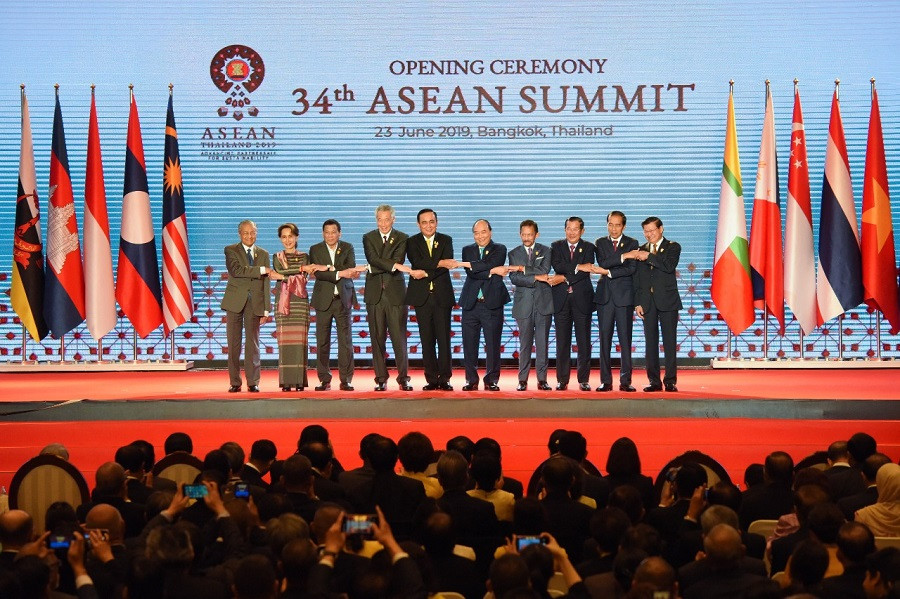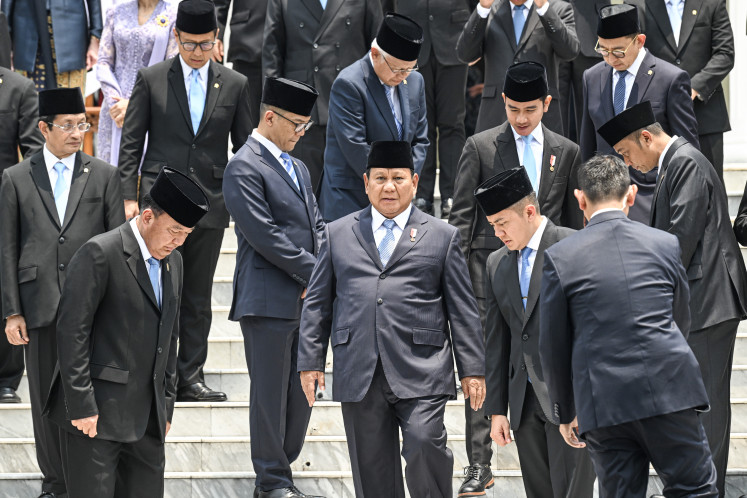Popular Reads
Top Results
Can't find what you're looking for?
View all search resultsPopular Reads
Top Results
Can't find what you're looking for?
View all search resultsIs AUKUS a problem or blessing for ASEAN?
There is no use to try to find a consensus or a common view among ASEAN member states whether AUKUS is either dangerous or beneficial to the region.
Change text size
Gift Premium Articles
to Anyone
T
he announcement of AUKUS –a new security arrangement involving the United States, the United Kingdom and Australia – has attracted all sorts of reactions from many quarters.
It is interesting to note that analysts and international relations specialists have been watching how ASEAN member states responded to the announcement. ASEAN members’ attitudes toward AUKUS have been described as ranging from anti (Malaysia) and supportive (Singapore, Vietnam, the Philippines) to uneasy (Indonesia) and uncertain or neutral (the rest of ASEAN).
The focus has also been on the possible or perceived implications of AUKUS for the region. Some argue that AUKUS, which paves the way for Australia to acquire nuclear-powered technology will have negative implications for nuclear non-proliferation. Others argue that AUKUS will invite a negative reaction from China, hence it will trigger an arms race and heighten conflict in the region.
One of the key elements highlighted by the critics is the extent to which the agreement presents a threat to ASEAN and Southeast Asia. For example, Kompas.id reported that France’s ambassador to Indonesia, Olivier Chambard, told a group of Indonesian journalists on Sept. 24 that AUKUS would not bring peace to the region but rather it posed a real threat to ASEAN. In Beijing, the Chinese Foreign Ministry’s director general for Asian affairs, Liu Jinsong, told a group of ambassadors from ASEAN member states that AUKUS “not only undermines the Southeast Asia Nuclear Weapon-Free Zone Treaty [SEANWFZ] but could spur regional arms races and create tension and division.”
Is AUKUS really a threat to ASEAN and Southeast Asia? If so, what forms would that threat take and how to address them? For one, the argument that AUKUS will soon turn Southeast Asia into a theater of war between China and the US is not very persuasive. It is even less convincing to argue that AUKUS will serve as the primary cause for other countries in the region to embark on the same quest to acquire nuclear-powered submarines. As for the SEANWFZ treaty, it remains an aspiration and has long been undermined anyway, with or without AUKUS, by the refusal of nuclear-weapon states to sign the protocols.
The real problem actually is not the establishment of AUKUS per se, but the underlying strategic context and circumstances within which such a strategic initiative – namely the formation of AUKUS – inevitably took place. That strategic context is the strategic rivalry between the US and China, and how the behavior of the two great powers affects other countries’ threat perceptions in the Indo-Pacific. A realistic perspective can provide at least three main answers to the question as to why AUKUS happened.
First, AUKUS is simply a logical consequence of the US-China rivalry. As the existing power, the US has concluded that China has now reached a position that can challenge US primacy, especially in the Indo-Pacific region. China, as a rising power, especially with the spectacular increase in its military capability and growing political influence, is perceived to have the potential to upset the balance of power.
In such circumstances, it has been predicted that the US, sooner or later, will be compelled to push back in order to ensure its supremacy and military preponderance. Strengthening the alliance relationship – in this context manifested in the establishment of AUKUS — constitutes a realistic strategic choice for the US.
Second, AUKUS is also a realistic strategic choice for Australia. AUKUS should be understood as a result of the growing perceptions in Australia, and of course in the US, of China’s threat. Whether the perceptions correspond with reality or not is beside the point.
The fact is, when a state feels that its sovereignty and national security is being threatened by a stronger power, it will seek a strategy to address that threat. One available strategy is alliance-making and balancing. If an alliance already exists, the natural step is to strengthen it. AUKUS, especially Australia’s position in it, reflects that logic of real politics.
Third, AUKUS happened because there is no effective regional security framework in the Indo-Pacific to prevent it. With regard to ASEAN-centered frameworks, as former Indonesian foreign minister Marty Natalegawa wrote, “the inception of AUKUS […] reminds us of the cost of its dithering and indecision in the complex and fast-evolving geopolitical environment”.
Indeed, ASEAN has become a too normative-oriented regional institution and, as a result, is no longer well equipped to deal with the evolving geopolitical challenges in the Indo-Pacific. As Australia is coping with economic pressure from China, ASEAN cannot act as a bridge to reconcile the differences between Australia and China.
For ASEAN, the priority now is not to waste time and energy whining over AUKUS. There is no use trying to find a consensus or a common view among ASEAN member states whether AUKUS is either dangerous or beneficial to the region. That would be futile, if not foolish, and would deepen the disunity among ASEAN members.
The key priority for ASEAN now is to find way to make itself relevant again. That will require deep thinking on the part of ASEAN on how to manage the defining challenge of the 21st century: great power rivalry.
We know that great power rivalry is dangerous. We know that it is risky for small and medium powers to take sides in such rivalry because of the risk of abandonment. We know that as tension grows, the competing powers will demand a clearer position. We in Southeast Asia might not like it, but we are already in the middle of it.
ASEAN wants to be friends to both. So, there is no need for China and the US to tell ASEAN countries how bad the other side is. For us, both China and the US can be potential sources of instability or sources of peace and prosperity. It is up to them to decide which role they want to play.
So, there is no point in the US and China pushing us to choose, because they might not like our choice. Recent developments around the world clearly show that when smaller powers are pressurized by big powers to submit, the result is often the opposite of that which is sought.
***
The writer is a senior fellow, Centre for Strategic and International Studies, Jakarta.










